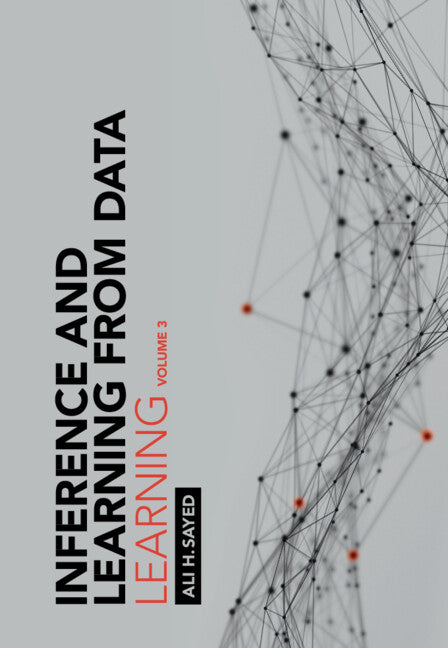Freshly Printed - allow 4 days lead
Couldn't load pickup availability
Inference and Learning from Data: Volume 3
Learning
Discover data-driven learning methods with the third volume of this extraordinary three-volume set.
Ali H. Sayed (Author)
9781009218283, Cambridge University Press
Hardback, published 22 December 2022
990 pages
25.5 x 18 x 4 cm, 1.76 kg
'The book series is timely and indispensable. It is a unique companion for graduate students and early-career researchers. The three volumes provide an extraordinary breadth and depth of techniques and tools, and encapsulate the experience and expertise of a world-class expert in the field. The pedagogically crafted text is written lucidly, yet never compromises rigor. Theoretical concepts are enhanced with illustrative figures, well-thought problems, intuitive examples, datasets, and MATLAB codes that reinforce readers' learning.' Abdelhak Zoubir, TU Darmstadt
This extraordinary three-volume work, written in an engaging and rigorous style by a world authority in the field, provides an accessible, comprehensive introduction to the full spectrum of mathematical and statistical techniques underpinning contemporary methods in data-driven learning and inference. This final volume, Learning, builds on the foundational topics established in volume I to provide a thorough introduction to learning methods, addressing techniques such as least-squares methods, regularization, online learning, kernel methods, feedforward and recurrent neural networks, meta-learning, and adversarial attacks. A consistent structure and pedagogy is employed throughout this volume to reinforce student understanding, with over 350 end-of-chapter problems (including complete solutions for instructors), 280 figures, 100 solved examples, datasets and downloadable Matlab code. Supported by sister volumes Foundations and Inference, and unique in its scale and depth, this textbook sequence is ideal for early-career researchers and graduate students across many courses in signal processing, machine learning, data and inference.
Preface
Notation
50. Least-squares problems
51. Regularization
52. Nearest-neighbor rule
53. Self-organizing maps
54. Decision trees
55. Naive Bayes classifier
56. Linear discriminant analysis
57. Principal component analysis
58. Dictionary learning
59. Logistic regression
60. Perceptron
61. Support vector machines
62. Bagging and boosting
63. Kernel methods
64. Generalization theory
65. Feedforward neural networks
66. Deep belief networks
67. Convolutional networks
68. Generative networks
69. Recurrent networks
70. Explainable learning
71. Adversarial attacks
72. Meta learning
Author index
Subject index.
Subject Areas: Signal processing [UYS], Pattern recognition [UYQP], Machine learning [UYQM], Communications engineering / telecommunications [TJK], Information theory [GPF]


